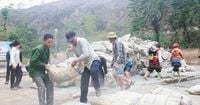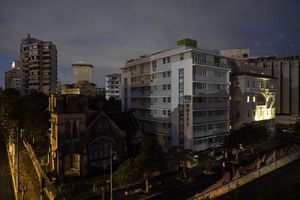In a concerted effort to improve living conditions, the Bat Xat district in Vietnam is making significant strides in eliminating temporary and dilapidated housing. Under a government initiative, the district has directed its communes and towns to assess the needs for cement support among households eligible for assistance. This initiative is part of a broader plan to eradicate 1,471 substandard homes by 2025, which includes constructing 598 new houses and repairing 873 existing ones.
As of now, local authorities have successfully implemented plans for all 1,471 houses, achieving a remarkable 100% completion rate. This includes the construction of 105 new homes and the repair of 517 others. A total of 1,400 tons of cement has been allocated to support these efforts, reflecting a strong commitment from the community and local businesses.
Similarly, in Ha Tinh province, the local police force has taken a proactive approach to support families in need through the program "Joining Hands to Eliminate Temporary and Dilapidated Houses in 2025." This initiative has seen police officers actively engage in building and repairing homes for those in difficult circumstances.
On April 3, 2025, the Ky Van Commune Police, along with community officials and local security forces, began dismantling the old home of Mr. Nguyen Van Giai, a dedicated community police officer who has served for over 20 years. Despite his commitment to public service, Mr. Giai lived in a dilapidated house that posed safety risks during storms. The police mobilized resources, including donations from the community and contributions from officers' salaries, to help rebuild his home.
Major Nguyen Anh Duc, the head of the Ky Van Commune Police, emphasized the importance of this initiative, stating that the timely construction of a new home for Mr. Giai exemplifies the spirit of community solidarity and shared responsibility. He noted, "This is a practical action reflecting the collective effort of the community to achieve sustainable development goals and alleviate poverty."
At the same time, police forces from neighboring communes, including Ky Xuan, Ky Thuong, and My Long, have launched similar campaigns. They are providing both material support and labor to dismantle old, unsafe houses and construct new ones for families like those of Le Thi Mai, Cao Thi Thuy, and Le Thi San, who have long endured poor living conditions.
Colonel Nguyen Trung Kien, Deputy Director of the Ha Tinh Police Department, highlighted the police's role in community development, stating that they are not just law enforcement officers but also pioneers in promoting community initiatives. He added that the police aim to ensure that no one is left behind, and everyone has access to safe and secure housing.
To expedite the construction and repair of homes, the Ha Tinh Police Department has instructed local police units to assist at least one family in need in their respective areas. This support goes beyond just labor; officers are also volunteering their own funds to help families that face particularly challenging situations, such as the elderly, the sick, or those living in extreme poverty.
The active participation of various community groups, including farmers, youth organizations, and women's associations, has further bolstered these efforts. For instance, the Farmers' Union has mobilized over 3,000 days of labor, while the Youth Union and Women's Union have contributed nearly 3,300 and 3,500 days of labor, respectively. Alongside financial contributions from local government and organizations, these efforts have collectively raised several billion VND to support housing projects.
As part of its ambitious goal, the Ha Tinh province aims to repair and build more than 2,300 solid homes for the poor and those in need by the end of 2025. The police have already facilitated the construction of over 2,000 new homes for disadvantaged families and those in need since the beginning of the year. The target is to ensure that by May 19, 2025, there will be no more dilapidated or temporary housing in the province.
In conclusion, the collaborative efforts of local authorities, law enforcement, and community members in both Bat Xat and Ha Tinh provinces illustrate a strong commitment to improving living conditions for vulnerable populations. By mobilizing resources and fostering community spirit, these initiatives are not only addressing immediate housing needs but also laying the groundwork for sustainable development and social equity in Vietnam.





